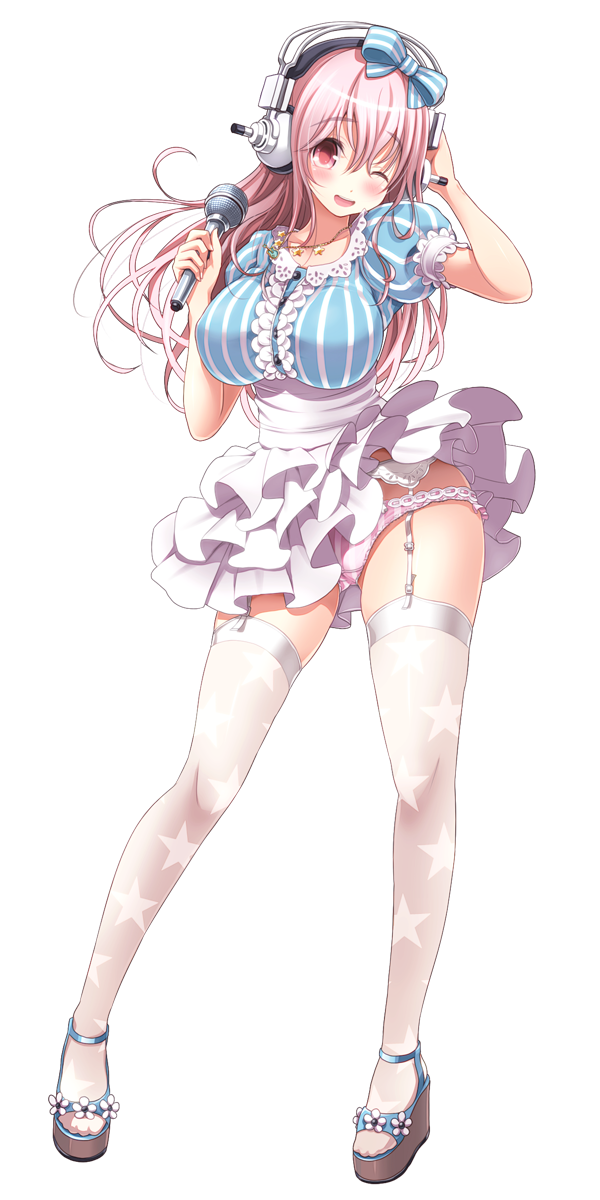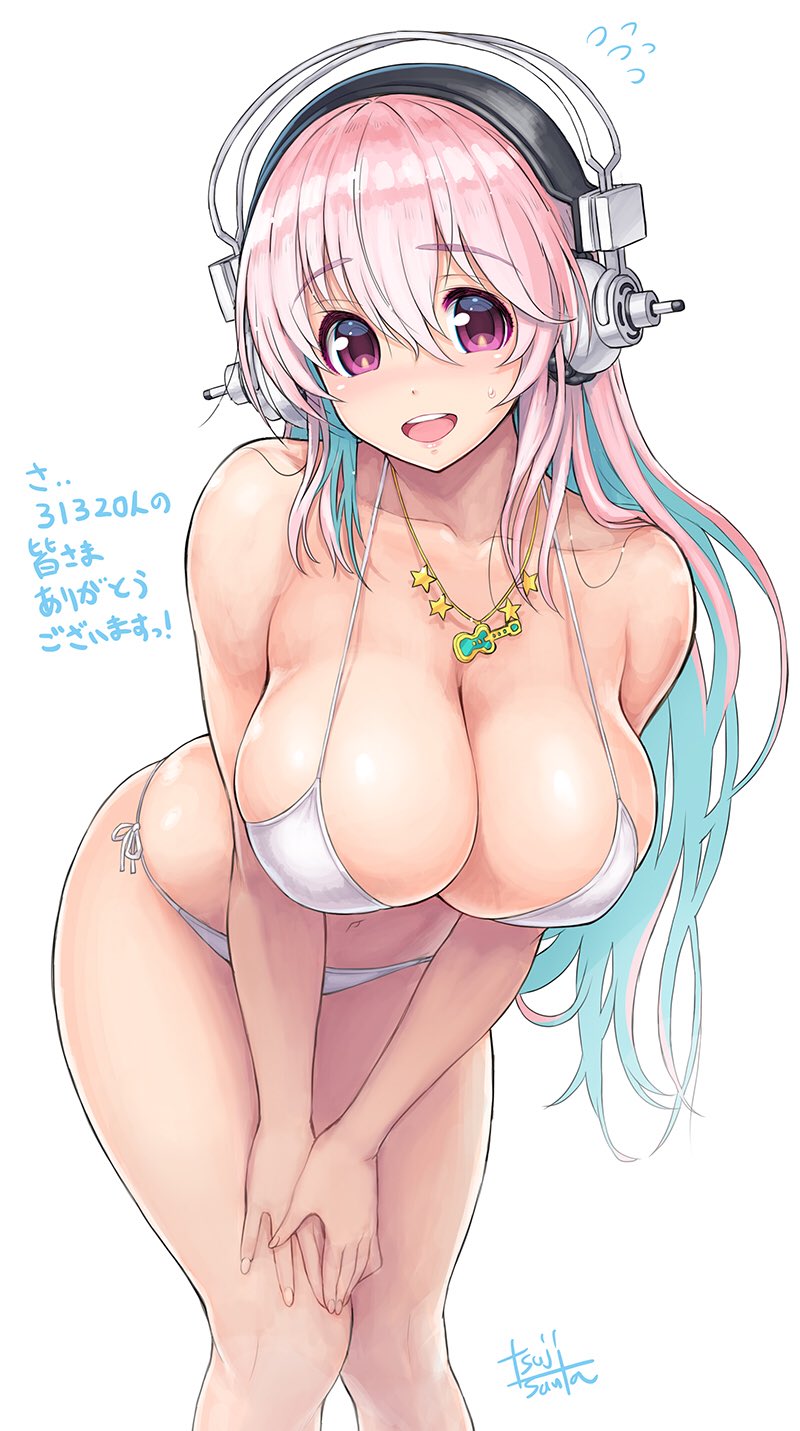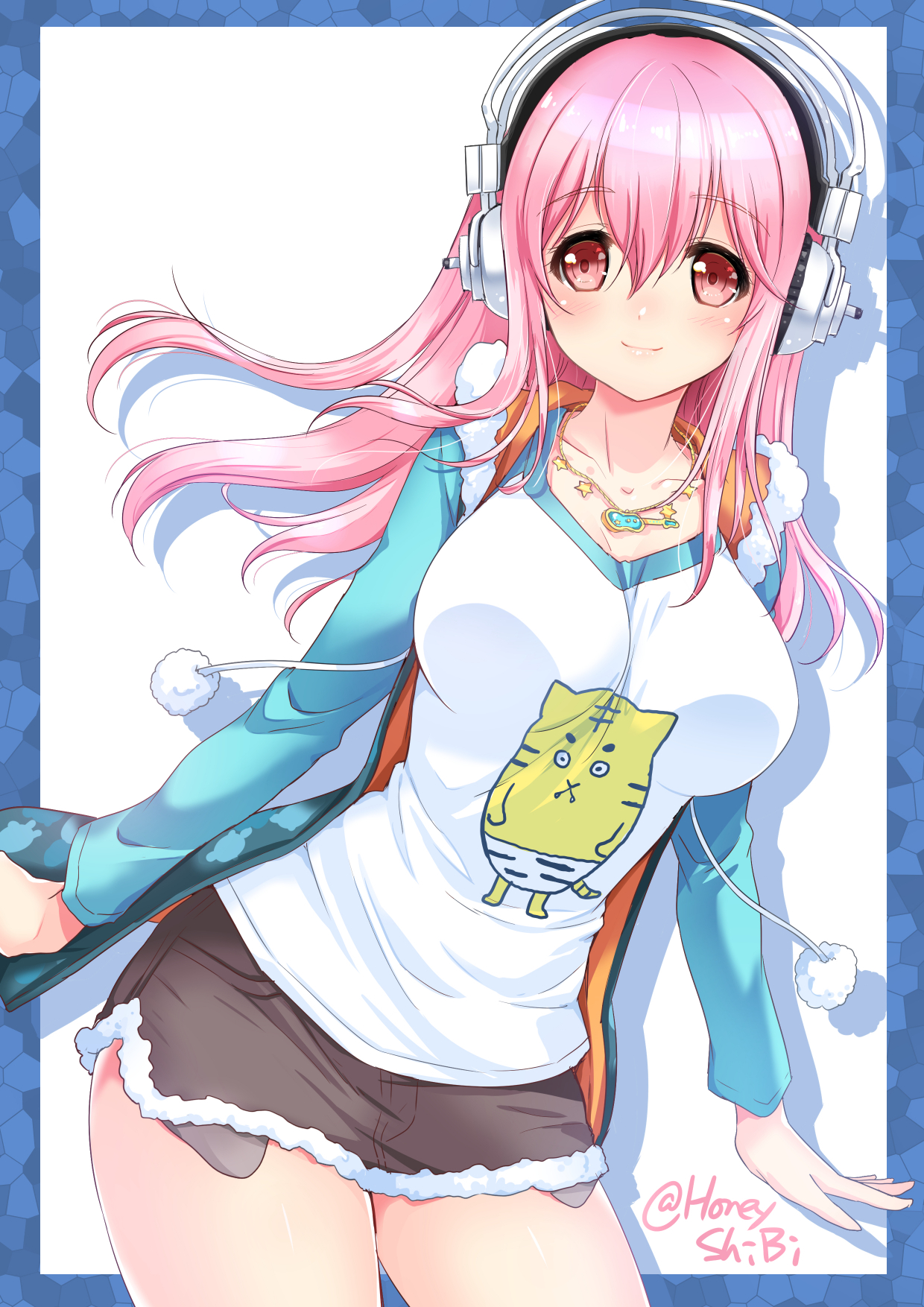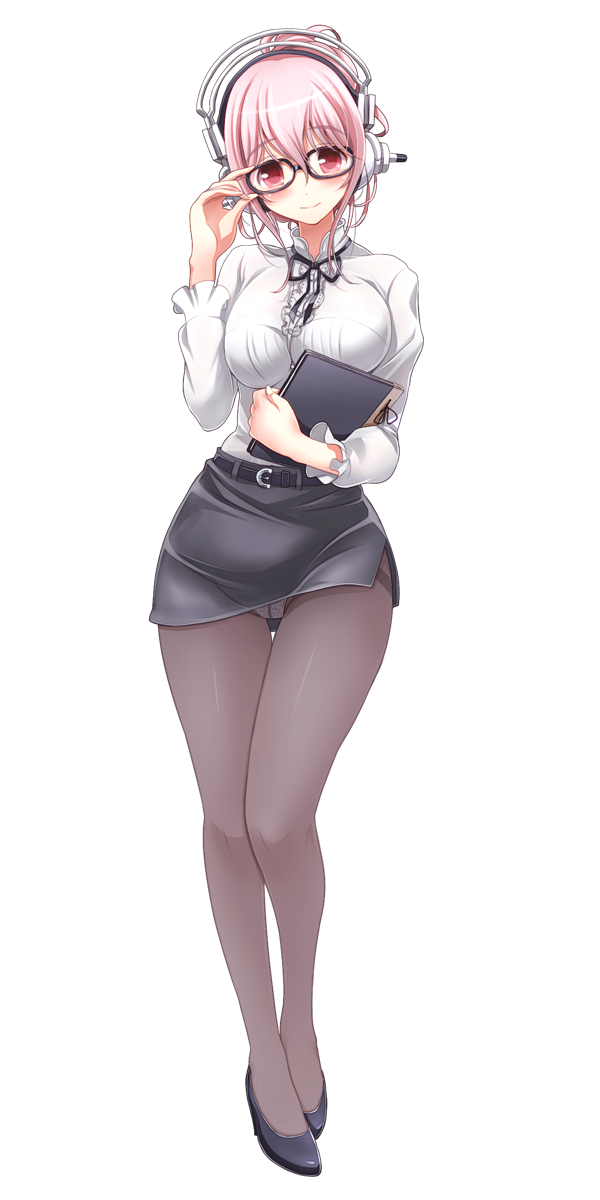
S U P E R S O N I C O
"I'll do my best!"
Profile
Real Name: Suzu Sakura (桜 鈴)
Stage Name: Super Sonico (すーぱーそに子)
Nickname(s): Suzu, Sonico, Nico-chan
Sex: Female
Age: 19
Birthday: October 14th, 20XX
Eyes: Reddish pink
Hair: Pink
Height: 158 cm (~5'2")
Weight: 54.4 kg (~119.9 lbs)
B/W/H: 90/57/87 (cm)
Ethnicity: Japanese
Nationality: Japanese
General Alignment: Neutral Good
Wrestling Alignment: Face
Entrance Music:

Faceclaim: Super Sonico (Nitroplus)
Pictures
Click to expand
Wrestling Atttire


Bikini







Casual Attire






Miscellaneous




Special Attire



Personality
Click to expand
One would expect a former idol and current musician to be outgoing and comfortable around people. Yet, Suzu defies this expectation. She has always been socially awkward and introverted, something which greatly bothered her as she was growing up. However, it is this very awkwardness that endears her to her fans. There is something about a sweet, pretty girl made vulnerable by her imperfection that draws people in. Publicly, Suzu is known for her kindhearted, adorkable demeanor and geekiness. Her tendency to get flustered and proclivity towards clumsiness is also common knowledge among her fans.
While some public figures maintain vastly different public and private personas, these two facets are largely consistent for Suzu. The public image she cultivates through her musical performances, meet-and-greets, and streams is almost entirely authentic. Yet, contrary to public perception, the true Suzu is much more nuanced than a simple adorkable geek. There are many facets to Suzu, some of which are sequestered away from the public eye.
While some public figures maintain vastly different public and private personas, these two facets are largely consistent for Suzu. The public image she cultivates through her musical performances, meet-and-greets, and streams is almost entirely authentic. Yet, contrary to public perception, the true Suzu is much more nuanced than a simple adorkable geek. There are many facets to Suzu, some of which are sequestered away from the public eye.
Secret
Underneath the veneer of Suzu's public persona lies a woman mired with deep-seated insecurity and self-doubt. She lacks an intrinsic sense of self worth and instead bases her self-worth on her music—an unfortunate habit that she learned early on. Despite being the lead guitarist and vocalist for an established band, as well as being a highly skilled musician, Suzu feels inadequate and insufficient. Although Suzu is presently not without success, she believes that she will only attain happiness and self-acceptance if she reaches the highest levels of success as a musician. Yet, Suzu's lack of self-confidence often makes this goal seem light years away in her mind.
This lack of confidence had led to Suzu consistently allowing herself to be pushed way outside of her comfort zone. Because Suzu is a naturally compliant person, her manager Kitamura can easily talk her into activities that make her uncomfortable, such as gravure modeling and hentai wrestling. All Suzu's manager needs to do is promise that such activities would help her music career, and Suzu's unwavering trust and compliant nature will do the rest. Since Suzu does not have the confidence to believe that she can make it without her manager and without relying on her body to draw attention to herself, Suzu feels as if she has no choice but to obey her manager. But inside, it kills Suzu to resort to using her body to augment her career—she would much rather stand on the merits of her music alone than to use her sex appeal to artificially boost it.
However, Suzu is more than a conglomerate of socially awkward geekiness, lack of confidence, and self-destructive compliance. She is quite driven and passionate, throwing herself into her music and studies. Even without studying music at the university level, she is an extremely high-level musician, often possessing skill that exceeds that of her better-trained counterparts. Moreover, Suzu is quite adept at teaching herself technical concepts, having a working knowledge of audio engineering and a knowledge of electrical engineering that exceeds her level of education. Given the chance, she can be quite talkative about technical topics, although she usually does not speak with much confidence and is wary of irritating people by rambling on.
Additionally, Suzu shows a great deal of independence, usually opting to rely on herself whenever possible to as not to burden others. While she is willing to rely on her manager for booking, Suzu tries to take care of as much as she can by herself. This manifests itself in Suzu having a strong hand in setting up her musical equipment, with her often setting up her own equipment rather than relying on audio engineers. Additionally, Suzu rarely seeks help with her schoolwork, usually opting to figure stuff out herself—a risky strategy, but still a usable one given Suzu's intelligence.
Suzu also feels a strong sense of loyalty to those who are close to her. She cares deeply for her bandmates, which further motivates her to do well in her music career as doing so would also benefit them. Yet, as loyal as Suzu is to her bandmates, the locus of her loyalty is firmly centered on Kitamura, the man whom Suzu feels saved her from her oppressive idol career and was responsible for her current musical success. Disobeying Kitamura would be tantamount to betrayal in Suzu's mind, so Suzu will follow his every command—even if it makes her uncomfortable and kills her inside.
A sense of stubbornness further shackles Suzu to Kitamura. While Suzu is typically timid and unwilling to take a stand, she will stubbornly stick with those whom she is loyal to—namely Kitamura. If one were to challenge Suzu on her questionable relationship with Kitamura, one can expect Suzu to non-aggressively double down and turn a blind eye to the insidious aspects of that relationship. A similar stubbornness drives Suzu to push herself to excel both musically and academically, even to the point where doing so becomes self-destructive.
Ultimately, Suzu is a kind soul who is weighed down by many struggles. The issues of self-identity, self-worth, and self-confidence are all salient to Suzu. Some of her positive traits—such as ambition, relentless pursuit of excellence, loyalty, and resolve—serve as double-edged swords, both propelling her to higher heights and cutting her apart. Even if she does not believe it herself, Suzu is quite capable and resilient—but amidst all of her struggles, it is uncertain whether Suzu will triumph or be torn down, swallowed up by the harshness of reality.
This lack of confidence had led to Suzu consistently allowing herself to be pushed way outside of her comfort zone. Because Suzu is a naturally compliant person, her manager Kitamura can easily talk her into activities that make her uncomfortable, such as gravure modeling and hentai wrestling. All Suzu's manager needs to do is promise that such activities would help her music career, and Suzu's unwavering trust and compliant nature will do the rest. Since Suzu does not have the confidence to believe that she can make it without her manager and without relying on her body to draw attention to herself, Suzu feels as if she has no choice but to obey her manager. But inside, it kills Suzu to resort to using her body to augment her career—she would much rather stand on the merits of her music alone than to use her sex appeal to artificially boost it.
However, Suzu is more than a conglomerate of socially awkward geekiness, lack of confidence, and self-destructive compliance. She is quite driven and passionate, throwing herself into her music and studies. Even without studying music at the university level, she is an extremely high-level musician, often possessing skill that exceeds that of her better-trained counterparts. Moreover, Suzu is quite adept at teaching herself technical concepts, having a working knowledge of audio engineering and a knowledge of electrical engineering that exceeds her level of education. Given the chance, she can be quite talkative about technical topics, although she usually does not speak with much confidence and is wary of irritating people by rambling on.
Additionally, Suzu shows a great deal of independence, usually opting to rely on herself whenever possible to as not to burden others. While she is willing to rely on her manager for booking, Suzu tries to take care of as much as she can by herself. This manifests itself in Suzu having a strong hand in setting up her musical equipment, with her often setting up her own equipment rather than relying on audio engineers. Additionally, Suzu rarely seeks help with her schoolwork, usually opting to figure stuff out herself—a risky strategy, but still a usable one given Suzu's intelligence.
Suzu also feels a strong sense of loyalty to those who are close to her. She cares deeply for her bandmates, which further motivates her to do well in her music career as doing so would also benefit them. Yet, as loyal as Suzu is to her bandmates, the locus of her loyalty is firmly centered on Kitamura, the man whom Suzu feels saved her from her oppressive idol career and was responsible for her current musical success. Disobeying Kitamura would be tantamount to betrayal in Suzu's mind, so Suzu will follow his every command—even if it makes her uncomfortable and kills her inside.
A sense of stubbornness further shackles Suzu to Kitamura. While Suzu is typically timid and unwilling to take a stand, she will stubbornly stick with those whom she is loyal to—namely Kitamura. If one were to challenge Suzu on her questionable relationship with Kitamura, one can expect Suzu to non-aggressively double down and turn a blind eye to the insidious aspects of that relationship. A similar stubbornness drives Suzu to push herself to excel both musically and academically, even to the point where doing so becomes self-destructive.
Ultimately, Suzu is a kind soul who is weighed down by many struggles. The issues of self-identity, self-worth, and self-confidence are all salient to Suzu. Some of her positive traits—such as ambition, relentless pursuit of excellence, loyalty, and resolve—serve as double-edged swords, both propelling her to higher heights and cutting her apart. Even if she does not believe it herself, Suzu is quite capable and resilient—but amidst all of her struggles, it is uncertain whether Suzu will triumph or be torn down, swallowed up by the harshness of reality.
Combat Information
General
Strategy: Try to do her best!
Fighting Style(s): Untrained
Preferred Attacks: Strikes
Martial Arts
Primary: Untrained
Secondary: N/A
Match Preferences
Preferred Matches: "Whatever my manager says!"
Attitude To Hentai: "If my manager insists..."
Other
Statistics:
Moves and Combinations:
Additional Information:
History
Click to expand
WARNING/DISCLAIMER
Because this backstory pertains to the dark side of the Japanese entertainment industry and idol culture, this backstory contains many sensitive themes and topics. While this backstory does not include sex or violence, there are sexual themes as well as themes of neglect, manipulation, and exploitation. This backstory attempts to tackle these topics in a realistic, non-gratuitous, and respectful manner—however, there is no guarantee that this backstory is successful in that. Additionally, the inclusion of reprehensible actions and events in this backstory does not constitute support or approval for said actions or events.
Roleplay Note
Even though Suzu's backstory is quite dark, I do not intend to translate that darkness into RP. I intend to ignore/work around some of the darker implications of the backstory so as not to make RPs with Suzu needlessly dark. My intent is to RP Suzu as a cute musician girl who is easily embarrassed.
Because this backstory pertains to the dark side of the Japanese entertainment industry and idol culture, this backstory contains many sensitive themes and topics. While this backstory does not include sex or violence, there are sexual themes as well as themes of neglect, manipulation, and exploitation. This backstory attempts to tackle these topics in a realistic, non-gratuitous, and respectful manner—however, there is no guarantee that this backstory is successful in that. Additionally, the inclusion of reprehensible actions and events in this backstory does not constitute support or approval for said actions or events.
If you are sensitive to any of the aforementioned topics or themes, do not read this backstory.
Click to reveal the backstory
What makes a person worthwhile? Such a question evades an easy answer. Some would say that each and every human has intrinsic worth which is independent of external achievements or characteristics. Yet, it is human nature to want something more—something to separate one from everyone else and distinguish one as a unique individual. Many people use abilities, achievements, and status to derive a sense of worthiness. Suzu Sakura is no exception. Her sense of worth is intimately tied to her identity as a musician, and has been from a young age.
Suzu was born into an unbroken household to a well-off couple living in Japan. Her father was a patent lawyer and her mother was a trauma surgeon. Suffice it to say, Suzu did not want for much materially. However, parental attention and affection was in short supply for Suzu as her parents rarely had time for her and generally acted distant. Yet, despite not doing much for Suzu beyond providing for her basic needs, Suzu's parents expected good behavior and academic excellence from Suzu. Apart from those expectations, though, Suzu's parents were generally laissez faire when it came to Suzu, allowing her to explore whatever interests she desired so long as they did not require much parental involvement.
It took some effort for Suzu to figure out her interests. She was naturally shy, so social activities were a struggle for her—not to mention, her parents did very little to encourage Suzu to socialize. Moreover, she was clumsy and awkward, so sports were out of the question. If she tried to draw, her parents would react indifferently to her childish drawings. It was by chance that Suzu's parents observed a young, three year-old Suzu pretending to play the piano by tapping her fingers on a table. This spurred Suzu's parents to enroll her in piano lessons. Shortly thereafter, violin lessons began as well.
Suzu showed an unnatural talent for music. Even her usually indifferent parents gave slight acknowledgement to Suzu's skills. This encouragement, however minor, galvanized Suzu to devote herself to music. Her life consisted almost solely of academics and music, with not much else, and she excelled in both. She was extrinsically motivated—namely by her parents' expectations—to do well academically. On the flip-side, Suzu had quickly developed a strong intrinsic motivation to pursue music, one that could survive with or without outside praise.
Unsurprisingly, Suzu took to both singing and the guitar extremely well. Within less than one year, she was easily skilled enough to perform vocals and guitar—and perform she did. Wanting to help herself overcome her shyness, Suzu signed up for the school's talent show, which was scheduled to occur shortly before her twelfth birthday. During the talent show, she covered the song God Knows by Aya Hirano, singing the vocals while simultaneously playing the guitar. Despite her abject nervousness, Suzu put on a stellar performance, earning her rapturous applause. Suzu felt a sense of extreme elation as her music was met with effusive appreciation, something which she had never experienced before.
Suzu's performance caught the eye of a talent scout for a talent agency. After the performance, the scout approached Suzu and tried to recruit her to become an idol. Suzu was hesitant at first, unsure if she wanted the life of an idol. She fumbled her way through the conversation, acting like a nervous wreck. But in spite of that, the scout quickly got a read on Suzu. Through conversation, he ascertained that Suzu wanted to share her music and gain approval from it. Suzu's nervousness initially gave him pause, but upon hearing Suzu's reason for signing up for the talent show, he saw Suzu's earnest determination to overcome her social anxiety. So the scout offered a dream to Suzu. One where she could share her music to the world, gaining recognition as part of an idol group. A dream where, through being an idol, she would learn to overcome her social anxiety.
The scout's targeted pitch successfully reeled Suzu in. Suzu was sold. And her parents could not care less if she was an idol, provided that she behaved and pulled good grades. Thus, after having her lawyer father look over the contract, Suzu was given the clear to sign on as an idol, which she did.
The particular talent agency that Suzu was recruited to was one that put new idols on stage without rigorous training, marketing them as amateurs. For this talent agency, showing idols progress from inexperience to competence was part of the product. Thus, the then twelve year-old Suzu was thrown on stage with little preparation.
Suzu's idol debut started out as a disaster. She was so nervous that she hid in the bathroom for the entire performance, vomiting repeatedly out of anxiety. It was not until the performance was over that Suzu was found and finally found and coaxed out onto the stage. Standing on that stage, Suzu was terrified, knowing that she had failed. After one of the staff briefly explained the situation to the audience, Suzu stammered out an apology, bowing deeply as she did so. She expected to be met with raucous booing, but was instead met with heartwarming applause—her inexperienced mistake and heartfelt apology had endeared her to the fans. Motivated by the positive reception, Suzu then gave a short show, singing and dancing around. Her dancing was awkward, but her singing was on-point. Ultimately, this whole ordeal helped kickstart Suzu's idol career, giving her an early boost in popularity.
Yet, it did not take long for the dream that the talent agent had sold Suzu to begin unraveling. Suzu was only allowed to sing and dance, which meant that she could not play any of the other instruments she knew. Moreover, being part of an idol group meant that it was hard to Suzu to stand out. Granted, being an idol made Suzu better at interacting with people—yet, despite this, Suzu still felt a lot of anxiety when talking to people, even if she did not outwardly show it. Worse yet, being an idol had done little to nothing for Suzu in regards to learning to interact with people on a deeper level. She may have been superficially connected to others, but she still felt as lonely as ever.
During her time as an idol, the only person whom Suzu felt more than just a superficial connection with was a fellow idol named Mami Okabe. Mami had joined the same talent agency as Suzu almost two years after Suzu had joined. Although Suzu had been with the talent agency for longer than Mami, Suzu viewed Mami as her senpai as Mami was a little over two years older than her and already had eight years of experience as a junior idol. The two became friends, close enough to be on a first name basis , but not close enough for their friendship to stand the test of time. Mami ended up leaving the talent agency after around two years, and Suzu left roughly two months after Mami. After that, the two lost contact with each other.
Suzu ultimately spent four years as an idol. Those years were brutal, with her energy being torn between her duties as an idol and her academics. This took a massive toll on Suzu, leaving her perpetually stressed out and exhausted. Yet, in spite of that, Suzu still managed to perform well in both her academics and as an idol. Additionally, during this time, Suzu realized that she was being marketed for her looks and idol persona rather than her musical ability—having her inexperience be repeatedly fetishized and being forced to do multiple gravure photoshoots really drove home the notion that her music was peripheral to everything else. Moreover, Suzu came to discover that idols were often not viewed as genuine artists. This killed Suzu inside; she wanted to be valued for her music, not for some false persona or her looks. The former was not entirely genuine, and the latter had no bearing on who she was as a person. Not to mention that beauty is not permanent, and that one day, she would no longer have her beauty to fall back on.
Mostly.
Suzu's social media had attracted the attention of a music manager by the name of Kenji Kitamura (北村 健二). One of Kenji's clients, a semi-famous bass guitarist named Saya Fujimi (富士見 咲夜), had been wanting to start a band named First Astronomical Velocity (第一宇宙速度). Kitamura was able to find members for the band, but was having trouble finding a lead guitarist and vocalist. However, upon seeing Suzu's social media, Kitamura knew that he had found the right person. Thus, Kitamura set out to meet Suzu.
Kitamura did not have to wait for long as he was able to meet Suzu while she was at an industry networking event. To Suzu, Kitamura was like a lifeline. He offered to make her famous, not as an idol but as a proper musician. Kitamura told her that her music alone would carry her to the top—something which Kitamura wholeheartedly believed at the time. He promised her that people would value her for her music, rather than value her for her pretty face. All of this was exactly what Suzu wanted to hear. And Suzu figured that she could trust Kitamura as he was Saya Fujimi's agent and Saya had already found some success under Kitamura. Not to mention, Suzu was also a fan of Saya to boot. Thus, the newly sixteen year-old Suzu chose to abandon her life as an idol and join the nascent band.
Everything went according to plan for Kitamura. His research into Suzu had paid off, telling him exactly which buttons to press and which cards to play. And now Suzu saw him as a savior, one who freed her from the shackles of idolhood and gave her a golden opportunity to be appreciated for her music.
The first year and a half of Suzu's tenure as a member of First Astronomical Velocity was almost blissful. She got along extremely well with the other members, especially Saya, and for once, Suzu started to break out of her anxious shell. Shortly after joining the band, Suzu even got into streaming, albeit at the behest of Kitamura. While nervous at first, Suzu soon began streaming herself performing music and playing video games. Suzu's streams attracted more attention to the band, helping its fame to grow.
It was during these early days that Suzu adopted the stage name Super Sonico (すーぱーそに子) as she felt that adopting a new name would symbolize the rebirth she felt: Suzu the idol had faded, and she had been reborn as Super Sonico. And like a phoenix rising from the ashes, she burned brightly, her light apparent to all. On the back of its rising star Suzu, First Astronomical Velocity started to gain traction.
But eventually, not even Suzu's light could sustain the band's meteoric rise. The band's progress reached a plateau, and despite the best efforts of the band members and Kitamura, nothing could break the plateau. Morale began to dip, and everyone grew increasingly dejected. One month turned into six, with no signs of improvement. Suzu's eighteenth birthday fell on the tail-end of that six month period, but it was not a joyous occasion—she was weighed down by the stagnation of her band, and the burden of balancing her schoolwork with her musical career.
Unfortunately for Suzu, her situation became even more difficult from there. Being in the middle of her last year of high school, Suzu needed to start preparing for her future. Her heart told her to pursue music full-time, her recent struggles as a musician caused doubt to seep into her heart. Failing as a musician was a very real possibility in her mind. However, even if her music career had been skyrocketing, she still had her parents to contend with. They expected her to attain a higher education. Not only that, but they expected her to ultimately go into a "respectable" and "rigorous" career—think doctor, lawyer, engineer, scientist, academic, or some other career along those lines. Suzu, her heart filled with doubt, had initially decided to pursue her music career and a degree in audio engineering, and planned to use her degree as a fallback in case her music career failed. But parental expectations had killed that plan.
Not knowing what she wanted to study, Suzu felt lost. After much deliberation, though, Suzu decided to pursue her music career and a degree in electrical engineering. Effects pedals, audio equipment, and audio processing had been a moderate interest of hers for years. She knew that audio equipment was electrical in nature, and from her father (who had studied electrical engineering in undergrad), she knew that digital signal processing—which falls under electrical engineering—was commonly used in audio. Although Suzu did not feel any particular affinity for electrical engineering, she thought it would be cool to use electrical engineering as a way to understand audio on a deeper level. Moreover, Suzu figured that if her music career failed, she could use a degree in electrical engineering to get a job working with audio hardware or audio signal processing.
Suzu spent the last half of her final year in high school spread thin, split between multiple pursuits. She had to balance her music career, her regular schoolwork, and studying for entrance exams. This put an immense strain on Suzu, with her music career being hit the hardest. Suzu even ended up quitting streaming as she no longer felt that she had the time for it. Despite the difficulty, however, Suzu managed to achieve high marks in school and get into the prestigious Waseda University to study electrical engineering. She went on to graduate high school in March, and started her new life as a university student in April .
The first couple of weeks of university were a whirlwind of new experiences for Suzu. It was an exciting, yet stressful time, but Suzu seemed to be adapting well enough. However, underneath the flurry of feelings that is inherent with starting university, anxiety over her music career formed a dark undercurrent in Suzu's heart. Suzu felt trapped between two worlds—that of a college student and that of a musician—and she feared that she was neglecting herself as a musician.
But Kitamura soon drew Suzu back into the fold. Three weeks into Suzu's university career, Kitamura had an idea, one that could shatter the stagnation that the band had been facing. Kitamura called Suzu in for an emergency meeting, forcing her to miss class. Once Suzu arrived, making sure to ease into the topic first, Kitamura suggested to Suzu that she leverage her looks to give the band a boost. It took Suzu a while to realize what Kitamura was saying, but when she did, she immediately froze. She was shocked that Kitamura, who had assured her that she would be valued for her music rather than her looks, would even suggest such a thing. Suzu felt a sense of betrayal rise up in her chest. But then Kitamura offered rationalizations. He told her that looks were just a tool to attract attention and ultimately get more ears on her music. That there was nothing wrong with using the gifts that one had to further one's real goal. That she would still be a musician at heart, even if she leaned into suggestiveness on the side. Upon hearing these explanations, Suzu relaxed a bit. Between the demoralizing stagnation and the promise that she would still be, first and foremost, a musician, the idea of leveraging her looks to get a boost suddenly seemed more acceptable. At that point, Suzu was hesitant but sold; after all, her manager knew what he was doing, right?
Kitamura did not stop there, however. He told Suzu that she had an obligation to boost her bandmates, and that as the face of the band, it would be most useful to leverage her looks. Suzu, wanting to uplift her bandmates, agreed with this sentiment. By then, Suzu's doubts had been largely allayed. But the fact of the matter was, Suzu had still expressed doubt. Kitamura chastised Suzu for having doubts at the beginning, telling her that she had jumped to conclusions without hearing him out. That he had gotten the band this far, so his judgement should be trusted. He questioned whether Suzu trusted him or not, to which Suzu declared her absolute trust in him. Kitamura simply responded by saying that she needed to trust him, or else they could not work together anymore. After all of this, Suzu felt as if she had been in the wrong for doubting Kitamura, that her misgivings were shameful and unjustified, and that she had betrayed Kitamura by doubting him.
But even though the situation was improving, Suzu felt miserable. Her current gravure modeling reminded her of how she was made to do gravure modeling as an idol—only this time, the law would no longer protect her by limiting how risque the photoshoots could get. Gravure modeling left Suzu in a nearly constant state of unease. She was poignantly aware that compromising images of her were in circulation. Not only that, but the current situation had dredged up previously tucked-away worries about the gravure modeling she did as an idol. Suzu fought back against all of these feelings, with limited success. She managed to convince herself that this was what she wanted—after all, it was to promote her music, right?—but the dread did not go away.
Not only did gravure modeling weigh heavily on Suzu mentally, it also interfered with her schoolwork. Photoshoots would be conveniently scheduled during her classes, forcing her to miss class fairly regularly. Even when Suzu was in class, she could barely focus. Her mind was mired in anxiety about her current situation. Unable to perform at her best, Suzu pulled mediocre grades, often straddling the line between B's and C's. The once straight-A student, whose blend of high intelligence and work ethic had once netted her top marks, was reduced to mediocrity. Worse yet, Suzu's struggles went largely unnoticed: while she received passing comments about her absences, her passable grades dispelled most suspicion.
Despite Suzu's decline, morale between the other members of the band was on the rise, and all of the other members seemed to be optimistic. However, Suzu's ascent was starting to leave the rest of the band members behind. While all of Suzu's bandmates liked and cared for Suzu, they could not help but feel a growing sense of resentment towards her. Suzu felt increasingly distant from the rest of the band. It felt as if a subgroup had formed within the band which included every member except Suzu. While Saya made somewhat of an effort to reach out to and include Suzu, it was not enough to overcome her feeling of distantness. While Suzu and the rest of the band members were on friendly terms, it felt as if there were an insurmountable wall between them and herself. An insurmountable wall that would forever prevent her from attaining the closeness that she had once had with her bandmates.
Suzu was also dissatisfied with her music career. She still felt like a small fish in a big pond with only a paltry amount of renown. And even among those who did acknowledge her, Suzu worried that they cared more about her looks than her music. Suzu held on to Kitamura's assurance that her looks ultimately served to attract more attention to her music, desperately trying to convince herself that the small amount of recognition she got was for her music. She was mostly successful at this, but was unable to completely shake her suspicion.
While others in Suzu's position might turn to others for support, Suzu felt as if she was alone. Her parents had always been distant, her bandmates had grown distant, and she had no one that she considered a friend. That left her manager, Kitamura. But various factors prevented Kitamura from being a support for Suzu. Although Suzu was uncomfortable with gravure modeling, Kitamura had repeatedly assured Suzu that it was to promote her music and that it was no big deal. This happened every time Suzu tried to mention or allude to her discomfort. And the more Kitamura echoed those sentiments, the more Suzu believed them. Eventually, she came to believe that her discomfort with gravure modeling was invalid, and that it would be asinine to bring it up. Additionally, Suzu kept her other struggles to herself—she did not want to burden Kitamura with her struggles in school, nor did she want to trouble him by bringing up her isolation from the rest of the band. These were matters that Suzu believed were hers and hers alone to deal with. Moreover, because Suzu was used to being alone, her general state of isolation did not even register to her as a problem.
By February, Suzu was quite far into her death spiral, yet she was completely unaware of her perilous situation. The signs of her decline were clear, however. Her music career, which had previously been ostensibly unaffected by Suzu's internal turmoil, had since begun to slip. During her gravure photoshoots, she could no longer convincingly fake having light in her eyes and vivacity in her body. Instead, a dullness pervaded her form, sapping the life out of any picture taken of her. Her music also suffered, with her occasionally playing wrong notes or forgetting song lyrics. It was only through her consummate music skills that she was able to recover from these mistakes—had she been a lesser musician, her performances would have ended in disaster.
Kitamura was upset. His prized product was under-performing, and he needed a way to rectify this situation. To start, he knew that Suzu could be extremely driven under the right circumstances—if he could light a fire within Suzu, she would claw her way far enough out of her rut to be useful. But Kitamura was also eyeing an additional outcome. He did not just want to prevent the band from regressing; he wanted it to surge in popularity. Previously, Suzu's gravure photoshoots had catalyzed the band out of stagnation before, but they were no magic bullet. Those photoshoots already started to show diminishing returns. So Kitamura needed something more. Something more salacious, something that would turn even more heads than softcore gravure photos. He wanted to push Suzu to join LAW as a hentai wrestler to get even more publicity for the band.
It would be wrong to say that Kitamura was not nervous when he executed his plan. He knew that it was entirely possible that Suzu had been broken beyond repair and would never be useful again no matter what impetus one gave her. Moreover, part of him worried that Suzu would draw the line at hentai wrestling. After all, being a LAW hentai wrestler was a huge step up from nude gravure modeling. However, Kitamura knew that he had Suzu under his thumb—just how far under his thumb he had her was unclear to him, but he figured that there was a decent chance that Suzu would comply. And if she did not comply, Kitamura could do damage control to retain Suzu.
Kitamura called Suzu into his office. He started by praising Suzu for her past accomplishments, the ones that she achieved before her decline. This validation sent a surge of joy flooding through Suzu's chest, but Suzu could not help but feel a slight sense of dread. Shortly thereafter, that feeling was vindicated. Kitamura began voicing his displeasure over Suzu's recent performance. He blamed the band's current struggles on Suzu, and claimed that she was letting down her bandmates. Suzu's heart filled with shame, the feelings of failure rushing in. Tears began to well up in Suzu's eyes as Kitamura threatened to release her if she did not improve. But right as the first tears were about to be shed, Kitamura offered some words of encouragement. He said that he believed in her and knew that she could pull herself together. He praised Suzu's abilities and expressed confidence in her tenacity. He implored Suzu to not let down her bandmates, and expressed a belief that Suzu could make it as a musician.
Suzu's head was a mess, an amalgamation of resolve and fear. She believed that she had a role to play—that of a musician—and she was determined to fulfill that role. Suzu did not want to let Kitamura or her bandmates down, and she intrinsically wanted to find success as a musician. Although doubt started to encroach on her heart, making her doubt that she could pull herself together, Suzu felt that she had no choice but to fight on. To fulfill her duty. Light began to return to her eyes, and her entire body perked up.
Kitamura let Suzu bask in her resolve for a while. Then, he began to speak again. He mentioned that he knew a way that Suzu could help the band. A way that she could drum up publicity, even more so than the gravure photoshoots, and get more ears on its music. Not missing a beat, Kitamura assured Suzu that this would be mundane, that many people do it, and that hardly anyone would bat an eye. A wave of relief washed over Suzu—whatever this was, it seemed more palatable to her than risque modeling. Suzu let out a smile, her eyes gleaming with hope. Kitamura began to speak, first describing the idea in vague terms and gradually getting more concrete. The smile slowly faded, giving way to confusion. Then, trepidation followed.
Once Suzu realized what Kitamura was asking of her, it was like an icy bucket of water had been thrown in her face. Her body went rigid, but she forced her face to remain neutral so as not to belie her doubt. After all, Kitamura just wanted to help her career, right? He got her this far, did he not? What right did someone as inexperienced as her have to question him? Besides, hentai wrestling is not a big deal—she should not be this uncomfortable with it, right?
A small part of Suzu screamed at her to run, its voice barely louder than a harsh whisper. But the rest of her did not consider running to be an option. Ever since the incident where Kitamura convinced Suzu to do gravure modeling, Suzu was well-aware of the supposed consequence of doubting Kitamura: the end of their professional and personal relationship. So Suzu put on a smile and nodded in agreement at Kitamura's demand. Her heart started to pound, and she began to feel lightheaded. The closing interactions between herself and Kitamura were a blur to her. She managed to make it out of Kitamura's office, feeling as if her body were numb and ethereal. Suzu floated down the hall, rounding a corner and putting herself out of range. Then, a surge of emotions overwhelmed Suzu like a tsunami crashing onto a beach. Her body turned to lead and she collapsed onto the floor. She could feel her heart sinking, as if it were trying to burrow its way through the diaphragm and into the stomach. Tears began to spring from her eyes, flowing down her face and onto the linoleum floor. But she did not dare make a sound, lest she reveal her doubt to the man who expected complete faith from her.
A few days went by, and none of those days registered in Suzu's memory. She felt as if her brain was in a fog, unable to process what was happening to her. But then, the day of her LAW interview came, and everything started to feel a little more real.
Suzu expected the interview process for joining LAW to be more rigorous. But instead of a formal interview, Suzu was told to stand in place. The interviewer's eyes scanned over Suzu's body, lingering on her intimate areas. Suzu's heart pounded in her chest, her cheeks flushing red. She closed her eyes and waited in utter darkness. Then, the interviewer told her to turn around. Her eyelids popped open, eyes going wide as chills ran down her spine. She meekly turned around, presenting the interviewer with a view of her backside. Standing still, gaze affixed to the door, Suzu could almost feel the interviewer's gaze against her back. It felt as if a hand was lasciviously gliding across her body, touching every square inch of her. Finally, after what seemed like hours, the interviewer spoke up, telling her that she will suffice.
The rest of the interview was a blur to Suzu. After being groped by the interviewer's gaze, everything else about the interview seemed so mundane. Before Suzu knew it, she was officially signed to LAW. No fanfare, just a matter-of-fact acknowledgement that she was signed. Suzu felt numb. She could barely process the situation.
Later, after she arrived home and flopped onto her bed, everything hit her at once. Suddenly, she was confronted with the reality that she would be wrestling in the ring soon. Not only that, but as per Kitamura's wishes, it would be a hentai match. But Suzu had never even had sex before, let alone had sex in front of a roaring crowd. The idea of doing hentai wrestling petrified Suzu. The rhythmic contractions of her heart began to speed up and her breath became ragged. Then, tears started to stream down Suzu's face. She whimpered and cried, her body shaking violently as if she were shivering. Her entire body felt frigid. For the first time in years, Suzu wanted to cry out to her parents, who were halfway across the city. But she had long since given up on receiving any comfort from them. She tried to think back to anyone who could provide her solace. Normally, that would be Kitamura, but he was the one asking her to do hentai in the first place. And while she was ostensibly close to her bandmates, she did not feel like they could help her either. None of them were being asked to do hentai, and Suzu was unsure what to make of the rift that she had sensed between herself and them. So, in the end, Suzu was all alone. All she had was herself and her music.
Suzu spent the next two weeks coming to terms with her new reality, one where she would be a hentai wrestler in LAW. On a fundamental level, Suzu was not comfortable with doing hentai wrestling. But Suzu was determined to push through her extreme reservations and become a hentai wrestler. She used every rationalization she could to overcome her doubts: that participating in hentai wrestling would help her career and get more eyes on her music, that Kitamura knew what he was doing in suggesting hentai wrestling to promote the band, and that hentai wrestling had been normalized and thus was not a big deal. Suzu also convinced herself that hentai wrestling would help her achieve success as a musician, and that achieving such success would bring her happiness. Thus, in her mind, hentai wrestling became a means for her to attain happiness, and to escape from the unhappiness that she was currently feeling. After a week of intense self-talk and rationalization, Suzu managed to tenuously convince herself that she was not bothered by the idea of hentai wrestling, and would actively push away any feelings to the contrary. Ultimately, Kitamura did not have to do much convincing beyond what he had already done—Suzu did it herself.
Yet, even though Suzu spent those two weeks preparing herself to do something that was previously unthinkable for her, those two weeks were not completely gloomy. A chance meeting with her former idol senpai , Mami Okabe, led to an expansion of Suzu's social circle, lessening her isolation. This lessened isolation improved Suzu's mood, but it was no panacea—rather, it was almost akin to a stopgap measure to keep Suzu together, if only for a little longer.
Suzu was born into an unbroken household to a well-off couple living in Japan. Her father was a patent lawyer and her mother was a trauma surgeon. Suffice it to say, Suzu did not want for much materially. However, parental attention and affection was in short supply for Suzu as her parents rarely had time for her and generally acted distant. Yet, despite not doing much for Suzu beyond providing for her basic needs, Suzu's parents expected good behavior and academic excellence from Suzu. Apart from those expectations, though, Suzu's parents were generally laissez faire when it came to Suzu, allowing her to explore whatever interests she desired so long as they did not require much parental involvement.
It took some effort for Suzu to figure out her interests. She was naturally shy, so social activities were a struggle for her—not to mention, her parents did very little to encourage Suzu to socialize. Moreover, she was clumsy and awkward, so sports were out of the question. If she tried to draw, her parents would react indifferently to her childish drawings. It was by chance that Suzu's parents observed a young, three year-old Suzu pretending to play the piano by tapping her fingers on a table. This spurred Suzu's parents to enroll her in piano lessons. Shortly thereafter, violin lessons began as well.
Suzu showed an unnatural talent for music. Even her usually indifferent parents gave slight acknowledgement to Suzu's skills. This encouragement, however minor, galvanized Suzu to devote herself to music. Her life consisted almost solely of academics and music, with not much else, and she excelled in both. She was extrinsically motivated—namely by her parents' expectations—to do well academically. On the flip-side, Suzu had quickly developed a strong intrinsic motivation to pursue music, one that could survive with or without outside praise.
By the time she was eleven years old, Suzu had blossomed into quite the young musician. However, she was still very socially isolated, which caused Suzu considerable anguish. In order to help cope, Suzu turned to an additional form of escapism in addition to music: anime. The first anime that she watched was K-ON!, a relatively well-known music anime. This inspired Suzu to pick up the guitar and singing. Suzu's parents, always willing to indulge their daughter's interests provided they did not have to be involved, quickly signed Suzu up for singing and guitar lessons."Music and school are the only things I'm good for..." - Suzu
Unsurprisingly, Suzu took to both singing and the guitar extremely well. Within less than one year, she was easily skilled enough to perform vocals and guitar—and perform she did. Wanting to help herself overcome her shyness, Suzu signed up for the school's talent show, which was scheduled to occur shortly before her twelfth birthday. During the talent show, she covered the song God Knows by Aya Hirano, singing the vocals while simultaneously playing the guitar. Despite her abject nervousness, Suzu put on a stellar performance, earning her rapturous applause. Suzu felt a sense of extreme elation as her music was met with effusive appreciation, something which she had never experienced before.
Suzu's performance caught the eye of a talent scout for a talent agency. After the performance, the scout approached Suzu and tried to recruit her to become an idol. Suzu was hesitant at first, unsure if she wanted the life of an idol. She fumbled her way through the conversation, acting like a nervous wreck. But in spite of that, the scout quickly got a read on Suzu. Through conversation, he ascertained that Suzu wanted to share her music and gain approval from it. Suzu's nervousness initially gave him pause, but upon hearing Suzu's reason for signing up for the talent show, he saw Suzu's earnest determination to overcome her social anxiety. So the scout offered a dream to Suzu. One where she could share her music to the world, gaining recognition as part of an idol group. A dream where, through being an idol, she would learn to overcome her social anxiety.
The scout's targeted pitch successfully reeled Suzu in. Suzu was sold. And her parents could not care less if she was an idol, provided that she behaved and pulled good grades. Thus, after having her lawyer father look over the contract, Suzu was given the clear to sign on as an idol, which she did.
The particular talent agency that Suzu was recruited to was one that put new idols on stage without rigorous training, marketing them as amateurs. For this talent agency, showing idols progress from inexperience to competence was part of the product. Thus, the then twelve year-old Suzu was thrown on stage with little preparation.
Suzu's idol debut started out as a disaster. She was so nervous that she hid in the bathroom for the entire performance, vomiting repeatedly out of anxiety. It was not until the performance was over that Suzu was found and finally found and coaxed out onto the stage. Standing on that stage, Suzu was terrified, knowing that she had failed. After one of the staff briefly explained the situation to the audience, Suzu stammered out an apology, bowing deeply as she did so. She expected to be met with raucous booing, but was instead met with heartwarming applause—her inexperienced mistake and heartfelt apology had endeared her to the fans. Motivated by the positive reception, Suzu then gave a short show, singing and dancing around. Her dancing was awkward, but her singing was on-point. Ultimately, this whole ordeal helped kickstart Suzu's idol career, giving her an early boost in popularity.
Yet, it did not take long for the dream that the talent agent had sold Suzu to begin unraveling. Suzu was only allowed to sing and dance, which meant that she could not play any of the other instruments she knew. Moreover, being part of an idol group meant that it was hard to Suzu to stand out. Granted, being an idol made Suzu better at interacting with people—yet, despite this, Suzu still felt a lot of anxiety when talking to people, even if she did not outwardly show it. Worse yet, being an idol had done little to nothing for Suzu in regards to learning to interact with people on a deeper level. She may have been superficially connected to others, but she still felt as lonely as ever.
During her time as an idol, the only person whom Suzu felt more than just a superficial connection with was a fellow idol named Mami Okabe. Mami had joined the same talent agency as Suzu almost two years after Suzu had joined. Although Suzu had been with the talent agency for longer than Mami, Suzu viewed Mami as her senpai as Mami was a little over two years older than her and already had eight years of experience as a junior idol. The two became friends, close enough to be on a first name basis , but not close enough for their friendship to stand the test of time. Mami ended up leaving the talent agency after around two years, and Suzu left roughly two months after Mami. After that, the two lost contact with each other.
Suzu ultimately spent four years as an idol. Those years were brutal, with her energy being torn between her duties as an idol and her academics. This took a massive toll on Suzu, leaving her perpetually stressed out and exhausted. Yet, in spite of that, Suzu still managed to perform well in both her academics and as an idol. Additionally, during this time, Suzu realized that she was being marketed for her looks and idol persona rather than her musical ability—having her inexperience be repeatedly fetishized and being forced to do multiple gravure photoshoots really drove home the notion that her music was peripheral to everything else. Moreover, Suzu came to discover that idols were often not viewed as genuine artists. This killed Suzu inside; she wanted to be valued for her music, not for some false persona or her looks. The former was not entirely genuine, and the latter had no bearing on who she was as a person. Not to mention that beauty is not permanent, and that one day, she would no longer have her beauty to fall back on.
Towards the end of her idol career, Suzu established a social media presence for herself. She had previously eschewed social media as the idea of engaging with fans and strangers online made her nervous. However, realizing that social media could be used as a platform to showcase her musical talents, Suzu eventually overcame her fear and established a social media presence. She started to post videos of herself playing the guitar and singing, and would occasionally do live streams. Online, Suzu generally showed positivity befitting of an idol. Yet, despite her best efforts, Suzu inadvertently hinted at her dissatisfaction with her situation and desire to be seen as a musician. Fortunately for Suzu, this undercurrent of unhappiness was lost on her managers, who kept a close watch on her social media. Ultimately, Suzu amassed a small following online, but her online presence went mostly unnoticed."I want people to value me for me. For my music." - Suzu
Mostly.
Suzu's social media had attracted the attention of a music manager by the name of Kenji Kitamura (北村 健二). One of Kenji's clients, a semi-famous bass guitarist named Saya Fujimi (富士見 咲夜), had been wanting to start a band named First Astronomical Velocity (第一宇宙速度). Kitamura was able to find members for the band, but was having trouble finding a lead guitarist and vocalist. However, upon seeing Suzu's social media, Kitamura knew that he had found the right person. Thus, Kitamura set out to meet Suzu.
Kitamura did not have to wait for long as he was able to meet Suzu while she was at an industry networking event. To Suzu, Kitamura was like a lifeline. He offered to make her famous, not as an idol but as a proper musician. Kitamura told her that her music alone would carry her to the top—something which Kitamura wholeheartedly believed at the time. He promised her that people would value her for her music, rather than value her for her pretty face. All of this was exactly what Suzu wanted to hear. And Suzu figured that she could trust Kitamura as he was Saya Fujimi's agent and Saya had already found some success under Kitamura. Not to mention, Suzu was also a fan of Saya to boot. Thus, the newly sixteen year-old Suzu chose to abandon her life as an idol and join the nascent band.
Everything went according to plan for Kitamura. His research into Suzu had paid off, telling him exactly which buttons to press and which cards to play. And now Suzu saw him as a savior, one who freed her from the shackles of idolhood and gave her a golden opportunity to be appreciated for her music.
The first year and a half of Suzu's tenure as a member of First Astronomical Velocity was almost blissful. She got along extremely well with the other members, especially Saya, and for once, Suzu started to break out of her anxious shell. Shortly after joining the band, Suzu even got into streaming, albeit at the behest of Kitamura. While nervous at first, Suzu soon began streaming herself performing music and playing video games. Suzu's streams attracted more attention to the band, helping its fame to grow.
It was during these early days that Suzu adopted the stage name Super Sonico (すーぱーそに子) as she felt that adopting a new name would symbolize the rebirth she felt: Suzu the idol had faded, and she had been reborn as Super Sonico. And like a phoenix rising from the ashes, she burned brightly, her light apparent to all. On the back of its rising star Suzu, First Astronomical Velocity started to gain traction.
But eventually, not even Suzu's light could sustain the band's meteoric rise. The band's progress reached a plateau, and despite the best efforts of the band members and Kitamura, nothing could break the plateau. Morale began to dip, and everyone grew increasingly dejected. One month turned into six, with no signs of improvement. Suzu's eighteenth birthday fell on the tail-end of that six month period, but it was not a joyous occasion—she was weighed down by the stagnation of her band, and the burden of balancing her schoolwork with her musical career.
Unfortunately for Suzu, her situation became even more difficult from there. Being in the middle of her last year of high school, Suzu needed to start preparing for her future. Her heart told her to pursue music full-time, her recent struggles as a musician caused doubt to seep into her heart. Failing as a musician was a very real possibility in her mind. However, even if her music career had been skyrocketing, she still had her parents to contend with. They expected her to attain a higher education. Not only that, but they expected her to ultimately go into a "respectable" and "rigorous" career—think doctor, lawyer, engineer, scientist, academic, or some other career along those lines. Suzu, her heart filled with doubt, had initially decided to pursue her music career and a degree in audio engineering, and planned to use her degree as a fallback in case her music career failed. But parental expectations had killed that plan.
Not knowing what she wanted to study, Suzu felt lost. After much deliberation, though, Suzu decided to pursue her music career and a degree in electrical engineering. Effects pedals, audio equipment, and audio processing had been a moderate interest of hers for years. She knew that audio equipment was electrical in nature, and from her father (who had studied electrical engineering in undergrad), she knew that digital signal processing—which falls under electrical engineering—was commonly used in audio. Although Suzu did not feel any particular affinity for electrical engineering, she thought it would be cool to use electrical engineering as a way to understand audio on a deeper level. Moreover, Suzu figured that if her music career failed, she could use a degree in electrical engineering to get a job working with audio hardware or audio signal processing.
Suzu spent the last half of her final year in high school spread thin, split between multiple pursuits. She had to balance her music career, her regular schoolwork, and studying for entrance exams. This put an immense strain on Suzu, with her music career being hit the hardest. Suzu even ended up quitting streaming as she no longer felt that she had the time for it. Despite the difficulty, however, Suzu managed to achieve high marks in school and get into the prestigious Waseda University to study electrical engineering. She went on to graduate high school in March, and started her new life as a university student in April .
The first couple of weeks of university were a whirlwind of new experiences for Suzu. It was an exciting, yet stressful time, but Suzu seemed to be adapting well enough. However, underneath the flurry of feelings that is inherent with starting university, anxiety over her music career formed a dark undercurrent in Suzu's heart. Suzu felt trapped between two worlds—that of a college student and that of a musician—and she feared that she was neglecting herself as a musician.
But Kitamura soon drew Suzu back into the fold. Three weeks into Suzu's university career, Kitamura had an idea, one that could shatter the stagnation that the band had been facing. Kitamura called Suzu in for an emergency meeting, forcing her to miss class. Once Suzu arrived, making sure to ease into the topic first, Kitamura suggested to Suzu that she leverage her looks to give the band a boost. It took Suzu a while to realize what Kitamura was saying, but when she did, she immediately froze. She was shocked that Kitamura, who had assured her that she would be valued for her music rather than her looks, would even suggest such a thing. Suzu felt a sense of betrayal rise up in her chest. But then Kitamura offered rationalizations. He told her that looks were just a tool to attract attention and ultimately get more ears on her music. That there was nothing wrong with using the gifts that one had to further one's real goal. That she would still be a musician at heart, even if she leaned into suggestiveness on the side. Upon hearing these explanations, Suzu relaxed a bit. Between the demoralizing stagnation and the promise that she would still be, first and foremost, a musician, the idea of leveraging her looks to get a boost suddenly seemed more acceptable. At that point, Suzu was hesitant but sold; after all, her manager knew what he was doing, right?
Kitamura did not stop there, however. He told Suzu that she had an obligation to boost her bandmates, and that as the face of the band, it would be most useful to leverage her looks. Suzu, wanting to uplift her bandmates, agreed with this sentiment. By then, Suzu's doubts had been largely allayed. But the fact of the matter was, Suzu had still expressed doubt. Kitamura chastised Suzu for having doubts at the beginning, telling her that she had jumped to conclusions without hearing him out. That he had gotten the band this far, so his judgement should be trusted. He questioned whether Suzu trusted him or not, to which Suzu declared her absolute trust in him. Kitamura simply responded by saying that she needed to trust him, or else they could not work together anymore. After all of this, Suzu felt as if she had been in the wrong for doubting Kitamura, that her misgivings were shameful and unjustified, and that she had betrayed Kitamura by doubting him.
From then on, Suzu never questioned Kitamura again. Whenever she felt even an inkling of doubt towards him, she would tell herself that she was being irrational and that Kitamura knew best. With his newfound leverage, Kitamura coerced Suzu into doing gravure modeling. At first, the outfits and poses were run-of-the-mill for gravure photoshoots. Yet, with each gravure photoshoot, Suzu was eased into increasingly suggestive photoshoots, culminating in a nude photoshoot. Suzu felt doubts about the whole situation, but she kept them to herself. After all, the photoshoots seemed to have given publicity to the band, and the band was starting to see growth again. Suzu in particular saw a noticeable growth in popularity, one which outpaced the growth of the band as a whole and the other members."Okay... if that's what you think is best for me..." - Suzu to Kitamura after agreeing to leverage her looks
But even though the situation was improving, Suzu felt miserable. Her current gravure modeling reminded her of how she was made to do gravure modeling as an idol—only this time, the law would no longer protect her by limiting how risque the photoshoots could get. Gravure modeling left Suzu in a nearly constant state of unease. She was poignantly aware that compromising images of her were in circulation. Not only that, but the current situation had dredged up previously tucked-away worries about the gravure modeling she did as an idol. Suzu fought back against all of these feelings, with limited success. She managed to convince herself that this was what she wanted—after all, it was to promote her music, right?—but the dread did not go away.
Not only did gravure modeling weigh heavily on Suzu mentally, it also interfered with her schoolwork. Photoshoots would be conveniently scheduled during her classes, forcing her to miss class fairly regularly. Even when Suzu was in class, she could barely focus. Her mind was mired in anxiety about her current situation. Unable to perform at her best, Suzu pulled mediocre grades, often straddling the line between B's and C's. The once straight-A student, whose blend of high intelligence and work ethic had once netted her top marks, was reduced to mediocrity. Worse yet, Suzu's struggles went largely unnoticed: while she received passing comments about her absences, her passable grades dispelled most suspicion.
Despite Suzu's decline, morale between the other members of the band was on the rise, and all of the other members seemed to be optimistic. However, Suzu's ascent was starting to leave the rest of the band members behind. While all of Suzu's bandmates liked and cared for Suzu, they could not help but feel a growing sense of resentment towards her. Suzu felt increasingly distant from the rest of the band. It felt as if a subgroup had formed within the band which included every member except Suzu. While Saya made somewhat of an effort to reach out to and include Suzu, it was not enough to overcome her feeling of distantness. While Suzu and the rest of the band members were on friendly terms, it felt as if there were an insurmountable wall between them and herself. An insurmountable wall that would forever prevent her from attaining the closeness that she had once had with her bandmates.
The months passed, and with each passing month, Suzu sank deeper and deeper into depression. Every morning, Suzu brushed tears from her eyes and put on a demure smile. She isolated herself from others, and from a distance, no one could see the cracks in the mask she wore. Behind the mask lay a maelstrom of feelings. Suzu felt a profound sense of failure. She felt that she was supposed to be able to balance her music career and schoolwork—after all, she did somewhat well at that in high school—and that her inability to do so was a failure on her end. In her mind, her musical obligations were no excuse for her lackluster performance with her schoolwork. A sense of dissonance between herself and her field of study also echoed through Suzu's mind. Throughout her life, most concepts in school came quite easily to her. But now, concepts did not come as easily, and she sometimes found herself struggling to understand. And even though Suzu tried, she could never seem to pull anything higher than a B or a C. Suzu felt as if her struggles were a sign that she was not good enough for her major."Everything seems normal, but... sometimes I feel like there's a divide between me and my bandmates..." - Suzu
Suzu was also dissatisfied with her music career. She still felt like a small fish in a big pond with only a paltry amount of renown. And even among those who did acknowledge her, Suzu worried that they cared more about her looks than her music. Suzu held on to Kitamura's assurance that her looks ultimately served to attract more attention to her music, desperately trying to convince herself that the small amount of recognition she got was for her music. She was mostly successful at this, but was unable to completely shake her suspicion.
While others in Suzu's position might turn to others for support, Suzu felt as if she was alone. Her parents had always been distant, her bandmates had grown distant, and she had no one that she considered a friend. That left her manager, Kitamura. But various factors prevented Kitamura from being a support for Suzu. Although Suzu was uncomfortable with gravure modeling, Kitamura had repeatedly assured Suzu that it was to promote her music and that it was no big deal. This happened every time Suzu tried to mention or allude to her discomfort. And the more Kitamura echoed those sentiments, the more Suzu believed them. Eventually, she came to believe that her discomfort with gravure modeling was invalid, and that it would be asinine to bring it up. Additionally, Suzu kept her other struggles to herself—she did not want to burden Kitamura with her struggles in school, nor did she want to trouble him by bringing up her isolation from the rest of the band. These were matters that Suzu believed were hers and hers alone to deal with. Moreover, because Suzu was used to being alone, her general state of isolation did not even register to her as a problem.
By February, Suzu was quite far into her death spiral, yet she was completely unaware of her perilous situation. The signs of her decline were clear, however. Her music career, which had previously been ostensibly unaffected by Suzu's internal turmoil, had since begun to slip. During her gravure photoshoots, she could no longer convincingly fake having light in her eyes and vivacity in her body. Instead, a dullness pervaded her form, sapping the life out of any picture taken of her. Her music also suffered, with her occasionally playing wrong notes or forgetting song lyrics. It was only through her consummate music skills that she was able to recover from these mistakes—had she been a lesser musician, her performances would have ended in disaster.
Kitamura was upset. His prized product was under-performing, and he needed a way to rectify this situation. To start, he knew that Suzu could be extremely driven under the right circumstances—if he could light a fire within Suzu, she would claw her way far enough out of her rut to be useful. But Kitamura was also eyeing an additional outcome. He did not just want to prevent the band from regressing; he wanted it to surge in popularity. Previously, Suzu's gravure photoshoots had catalyzed the band out of stagnation before, but they were no magic bullet. Those photoshoots already started to show diminishing returns. So Kitamura needed something more. Something more salacious, something that would turn even more heads than softcore gravure photos. He wanted to push Suzu to join LAW as a hentai wrestler to get even more publicity for the band.
It would be wrong to say that Kitamura was not nervous when he executed his plan. He knew that it was entirely possible that Suzu had been broken beyond repair and would never be useful again no matter what impetus one gave her. Moreover, part of him worried that Suzu would draw the line at hentai wrestling. After all, being a LAW hentai wrestler was a huge step up from nude gravure modeling. However, Kitamura knew that he had Suzu under his thumb—just how far under his thumb he had her was unclear to him, but he figured that there was a decent chance that Suzu would comply. And if she did not comply, Kitamura could do damage control to retain Suzu.
Kitamura called Suzu into his office. He started by praising Suzu for her past accomplishments, the ones that she achieved before her decline. This validation sent a surge of joy flooding through Suzu's chest, but Suzu could not help but feel a slight sense of dread. Shortly thereafter, that feeling was vindicated. Kitamura began voicing his displeasure over Suzu's recent performance. He blamed the band's current struggles on Suzu, and claimed that she was letting down her bandmates. Suzu's heart filled with shame, the feelings of failure rushing in. Tears began to well up in Suzu's eyes as Kitamura threatened to release her if she did not improve. But right as the first tears were about to be shed, Kitamura offered some words of encouragement. He said that he believed in her and knew that she could pull herself together. He praised Suzu's abilities and expressed confidence in her tenacity. He implored Suzu to not let down her bandmates, and expressed a belief that Suzu could make it as a musician.
Suzu's head was a mess, an amalgamation of resolve and fear. She believed that she had a role to play—that of a musician—and she was determined to fulfill that role. Suzu did not want to let Kitamura or her bandmates down, and she intrinsically wanted to find success as a musician. Although doubt started to encroach on her heart, making her doubt that she could pull herself together, Suzu felt that she had no choice but to fight on. To fulfill her duty. Light began to return to her eyes, and her entire body perked up.
Kitamura let Suzu bask in her resolve for a while. Then, he began to speak again. He mentioned that he knew a way that Suzu could help the band. A way that she could drum up publicity, even more so than the gravure photoshoots, and get more ears on its music. Not missing a beat, Kitamura assured Suzu that this would be mundane, that many people do it, and that hardly anyone would bat an eye. A wave of relief washed over Suzu—whatever this was, it seemed more palatable to her than risque modeling. Suzu let out a smile, her eyes gleaming with hope. Kitamura began to speak, first describing the idea in vague terms and gradually getting more concrete. The smile slowly faded, giving way to confusion. Then, trepidation followed.
Once Suzu realized what Kitamura was asking of her, it was like an icy bucket of water had been thrown in her face. Her body went rigid, but she forced her face to remain neutral so as not to belie her doubt. After all, Kitamura just wanted to help her career, right? He got her this far, did he not? What right did someone as inexperienced as her have to question him? Besides, hentai wrestling is not a big deal—she should not be this uncomfortable with it, right?
A small part of Suzu screamed at her to run, its voice barely louder than a harsh whisper. But the rest of her did not consider running to be an option. Ever since the incident where Kitamura convinced Suzu to do gravure modeling, Suzu was well-aware of the supposed consequence of doubting Kitamura: the end of their professional and personal relationship. So Suzu put on a smile and nodded in agreement at Kitamura's demand. Her heart started to pound, and she began to feel lightheaded. The closing interactions between herself and Kitamura were a blur to her. She managed to make it out of Kitamura's office, feeling as if her body were numb and ethereal. Suzu floated down the hall, rounding a corner and putting herself out of range. Then, a surge of emotions overwhelmed Suzu like a tsunami crashing onto a beach. Her body turned to lead and she collapsed onto the floor. She could feel her heart sinking, as if it were trying to burrow its way through the diaphragm and into the stomach. Tears began to spring from her eyes, flowing down her face and onto the linoleum floor. But she did not dare make a sound, lest she reveal her doubt to the man who expected complete faith from her.
After what had seemed like hours, Suzu finally mustered the strength to get to her feet. With shaky legs, she made her way out of the building, her mind trapped in a fugue-like state. It was a miracle that she even made it home: between several close-calls with cars and nearly getting onto the wrong train multiple times, it had been as if Suzu was an accident waiting to happen. But in the end, she managed to clamber back to her dorm room and flop onto the bed. She lay in darkness, her eyes wide open with a steady trickle of tears flowing down her face and onto her bed. Suzu was unable to fall asleep that night as her mind was spinning, unable to comprehend the ramifications of this new development."I'll do my best!" - Suzu to Kitamura after agreeing to do hentai wrestling in LAW
A few days went by, and none of those days registered in Suzu's memory. She felt as if her brain was in a fog, unable to process what was happening to her. But then, the day of her LAW interview came, and everything started to feel a little more real.
Suzu expected the interview process for joining LAW to be more rigorous. But instead of a formal interview, Suzu was told to stand in place. The interviewer's eyes scanned over Suzu's body, lingering on her intimate areas. Suzu's heart pounded in her chest, her cheeks flushing red. She closed her eyes and waited in utter darkness. Then, the interviewer told her to turn around. Her eyelids popped open, eyes going wide as chills ran down her spine. She meekly turned around, presenting the interviewer with a view of her backside. Standing still, gaze affixed to the door, Suzu could almost feel the interviewer's gaze against her back. It felt as if a hand was lasciviously gliding across her body, touching every square inch of her. Finally, after what seemed like hours, the interviewer spoke up, telling her that she will suffice.
The rest of the interview was a blur to Suzu. After being groped by the interviewer's gaze, everything else about the interview seemed so mundane. Before Suzu knew it, she was officially signed to LAW. No fanfare, just a matter-of-fact acknowledgement that she was signed. Suzu felt numb. She could barely process the situation.
Later, after she arrived home and flopped onto her bed, everything hit her at once. Suddenly, she was confronted with the reality that she would be wrestling in the ring soon. Not only that, but as per Kitamura's wishes, it would be a hentai match. But Suzu had never even had sex before, let alone had sex in front of a roaring crowd. The idea of doing hentai wrestling petrified Suzu. The rhythmic contractions of her heart began to speed up and her breath became ragged. Then, tears started to stream down Suzu's face. She whimpered and cried, her body shaking violently as if she were shivering. Her entire body felt frigid. For the first time in years, Suzu wanted to cry out to her parents, who were halfway across the city. But she had long since given up on receiving any comfort from them. She tried to think back to anyone who could provide her solace. Normally, that would be Kitamura, but he was the one asking her to do hentai in the first place. And while she was ostensibly close to her bandmates, she did not feel like they could help her either. None of them were being asked to do hentai, and Suzu was unsure what to make of the rift that she had sensed between herself and them. So, in the end, Suzu was all alone. All she had was herself and her music.
Suzu spent the next two weeks coming to terms with her new reality, one where she would be a hentai wrestler in LAW. On a fundamental level, Suzu was not comfortable with doing hentai wrestling. But Suzu was determined to push through her extreme reservations and become a hentai wrestler. She used every rationalization she could to overcome her doubts: that participating in hentai wrestling would help her career and get more eyes on her music, that Kitamura knew what he was doing in suggesting hentai wrestling to promote the band, and that hentai wrestling had been normalized and thus was not a big deal. Suzu also convinced herself that hentai wrestling would help her achieve success as a musician, and that achieving such success would bring her happiness. Thus, in her mind, hentai wrestling became a means for her to attain happiness, and to escape from the unhappiness that she was currently feeling. After a week of intense self-talk and rationalization, Suzu managed to tenuously convince herself that she was not bothered by the idea of hentai wrestling, and would actively push away any feelings to the contrary. Ultimately, Kitamura did not have to do much convincing beyond what he had already done—Suzu did it herself.
Yet, even though Suzu spent those two weeks preparing herself to do something that was previously unthinkable for her, those two weeks were not completely gloomy. A chance meeting with her former idol senpai , Mami Okabe, led to an expansion of Suzu's social circle, lessening her isolation. This lessened isolation improved Suzu's mood, but it was no panacea—rather, it was almost akin to a stopgap measure to keep Suzu together, if only for a little longer.
Even though Suzu's backstory is quite dark, I do not intend to translate that darkness into RP. I intend to ignore/work around some of the darker implications of the backstory so as not to make RPs with Suzu needlessly dark. My intent is to RP Suzu as a cute musician girl who is easily embarrassed.
Relationships
Click to expand
- Kenji Kitamura (北村 健二) — Suzu's manager. Suzu is incredibly loyal to Kitamura and entrusts him with near-complete control over her career. Yet, there exists a pernicious undertone to their relationship, one that draws Suzu's autonomy into question...
- Mami "Parakeet" Okabe — Suzu's senpai from her idol days, current fellow Waseda University student, and current friend. A chance meeting between Mami and Suzu in a study lounge led to the two reuniting and Suzu being incorporated into Mami's social circle. On the surface, their friendship seems relatively normal—and it is. But Mami cannot help but worry about Suzu and her well-being...
Quick Facts
- Suzu tries to use her stage name Super Sonico (すーぱーそに子) when doing public activities. However, it is not uncommon for her to slip up and use her real name.
- Suzu is the lead vocalist and lead guitarist for the band First Astronomical Velocity (第一宇宙速度).
- Suzu can play the piano, violin, and guitar as well as sing.
- Suzu uses a heritage cherry Gibson SG electric guitar.
- Suzu is fairly skilled at video games.
- Suzu has perfect pitch.
- Suzu almost always wears a pair of headphones and listens to music nearly nonstop.
- Even when people are talking to her, she will not take her headphones off. However, she will pause her music and turn on transparency mode if someone is talking to her.
- Suzu is a fan of light-hearted anime, but can also enjoy anime with more realistic themes.
- Suzu's favorite foods are ramen (specifically char siu noodles) and macarons.
- Suzu loves cats.
Secret
- Suzu secretly keeps two Victorian Siamese cats in her dorm room at Waseda University. She exhausted almost all of her savings to get her cats.
- Suzu is an audiophile. She enjoys messing with audio equipment and always uses an equalizer to tweak the sound to her liking.
- Suzu's signature headphones, which she is always seen wearing, are noteworthy in a number of ways.
- Her headphones were a gift from her manager, Kitamura.
- Her headphones are extremely high-end, almost terrifyingly so.
- Her headphones have an absurdly flat frequency response and a freakishly low total harmonic distortion (THD), which means that her headphones can recreate sounds with very little distortion.
- Although her headphones inherently have an absurdly flat frequency response, Suzu uses an equalizer to fine-tune the sound to exactly how she wants it.
- Her headphones, with its highly efficacious blend of passive and active noise cancellation, render the outside world nearly silent to Suzu—great for listening to music and drowning out distractions, but a severe liability when walking around outside. Although Suzu's headphones do have transparency mode , she only really uses it when she needs to listen to people.
- Suzu's father studied electrical engineering in undergrad before becoming a patent lawyer.
- Suzu's relationship with her parents is very distant. Despite this, Suzu's father is quite willing to talk to Suzu about electrical engineering and explain concepts to her. This allowed Suzu to gain exposure to certain concepts in electrical engineering much earlier than one normally would.
- Suzu is extremely smart, although she does not fully realize this. She attributes her intellectual and academic success to hard work rather than raw intellect, and regards herself as merely "above average" when it comes to intelligence.
- Suzu's entrance theme, Romeo and Cinderella, was originally a Vocaloid song. However, Suzu has covered the song on numerous occasions.
- Suzu feels that her entrance theme, Romeo and Cinderella, is not a perfect fit for her. However, she feels that the theme of being forced into a dichotomous choice is relevant to her situation. She feels torn between going all-in on music and potentially failing versus the "safer" option of going to university and getting a degree that she could fall back on.
- Before joining First Astronomical Velocity (第一宇宙速度), Suzu was a fan of her bassist bandmate Saya Fujimi (富士見 咲夜). Suzu is still a fan of her.
- Suzu's bandmates often call her "Nico-chan", which is derived from her stage name "Super Sonico".

A special thanks to Malkavia for giving feedback that helped improve the character banner image at the top of this character profile.

